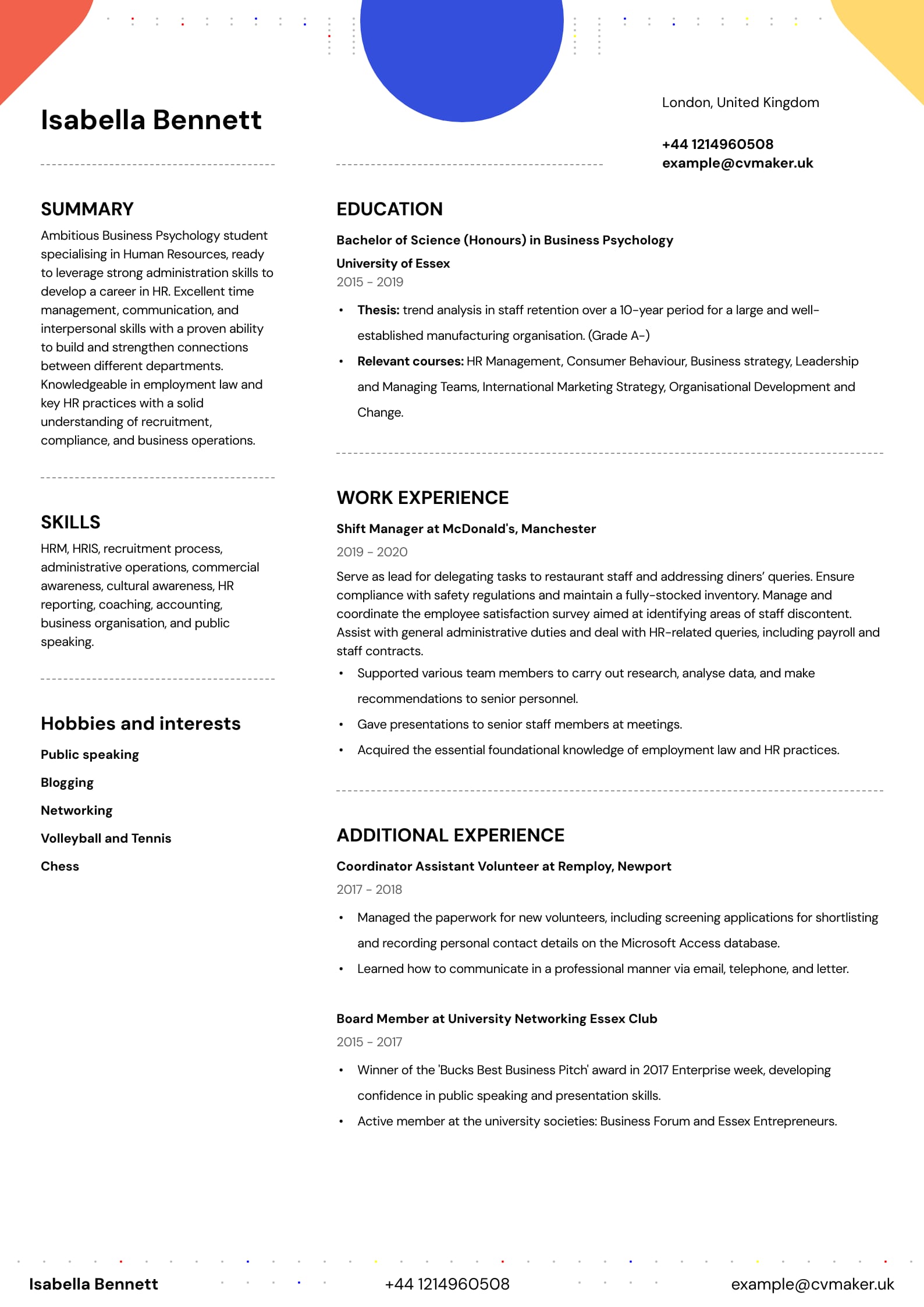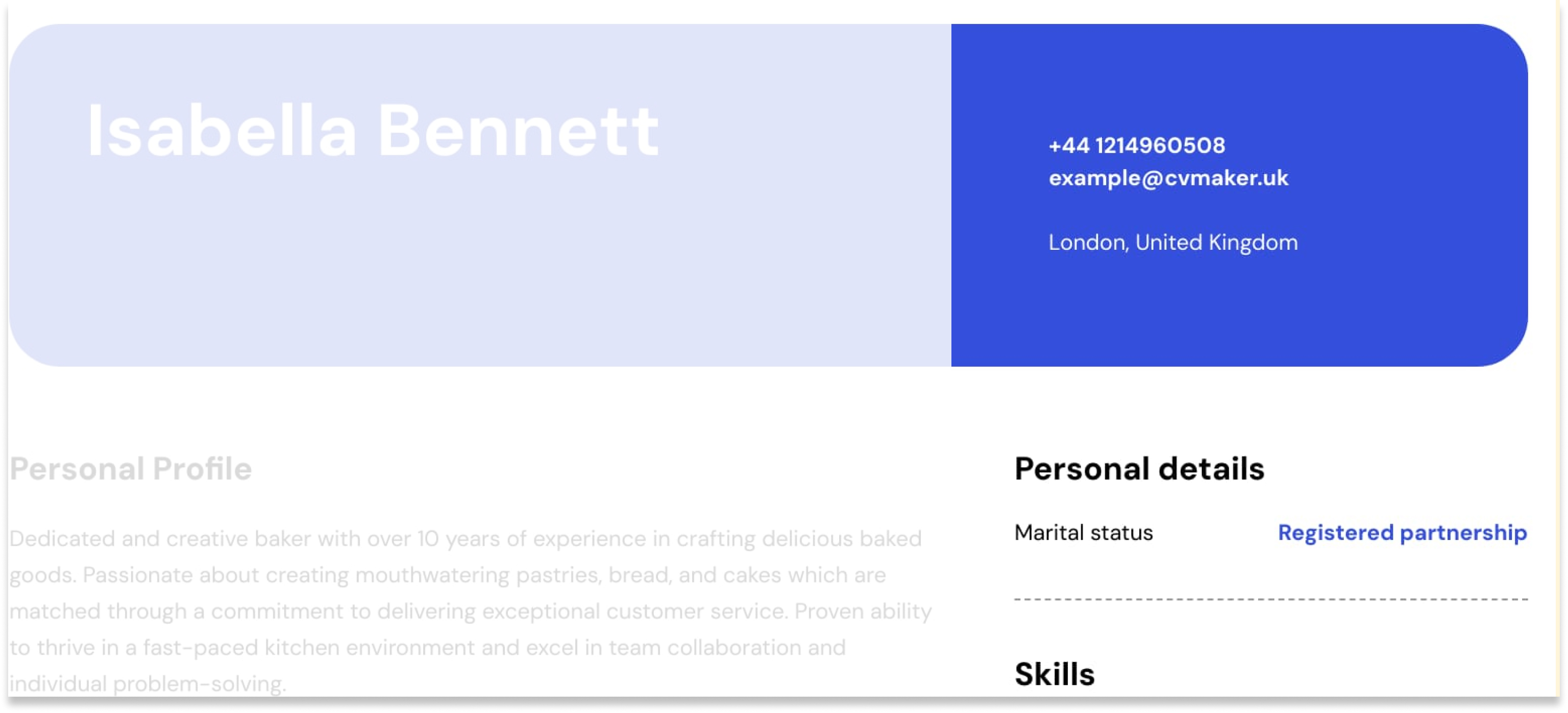When creating your CV, every detail matters. As a jobseeker in the UK, especially if you're stepping into the workforce for the first time, crafting a CV can feel both exciting and overwhelming. One common dilemma is deciding which CV personal details to include.
While sections like contact information and educational background are straightforward, others, such as marital status, can be confusing. Should you include your marital status in a CV, or is it unnecessary?
In this article, we break down the role marital status plays in CV writing, what employers expect, and how to ensure your CV reflects a modern, professional approach that sets you apart.
In this article, we cover:
Whether marital status is important on a CV.
What to write in the marital status section of your CV (if required).
Reasons to avoid including marital status in most UK job applications.
How to tailor your CV to meet job requirements.
Key takeaways for creating a professional CV.
Next steps for enhancing your CV and job search process.
Let CVMaker guide you through the CV writing process, offering professional CV templates to highlight your strengths.
The best CV builder
Effortlessly create a professional CV
Easy to use on any device
Integrated spelling and grammar check
Customisable job-specific CV examples

Is marital status important on a CV?
The simple answer is: not usually. In the UK, including your marital status on your CV is generally unnecessary and irrelevant to most employers. Disclosing whether you’re married, single, or in a relationship rarely affects your ability to perform a job. In fact, it’s often better to focus on personal and professional details that demonstrate your skills and qualifications.
Additionally, UK law makes it illegal for employers to discriminate based on marital status. So, whether you’re single, married, or have a life partner, this detail doesn’t typically belong on your CV, similar to listing your date of birth or nationality in a CV. Instead, prioritise work experience, educational backgrounds, and skills.
However, there are specific scenarios, such as international job applications or marriage biodatas, where including marital status might be customary. Understanding these nuances is crucial to tailoring your CV appropriately.
If you are an international student applying for a job in the UK or writing your first CV, keep reading to learn how to write a good CV for the UK job market.
Pro tip
Tailor your CV for each application. Highlight skills and experiences relevant to the specific job you’re applying for to show you’ve done your homework.
What to write in marital status in a CV
If you’re creating a CV for an international role or a specific situation where marital status might be expected (such as a biodata CV tailored for certain contexts), you may need to include it. Here’s how to approach this:
Place this in the personal details section, alongside your date of birth or other family details, only if explicitly requested.
Avoid adding unnecessary family background or contact information unless required by the job application.
Examples of how you can list marital status in a CV:
Single
Divorced
Widowed
Unmarried
Living together
Registered partnership or civil partnership.

For instance, a biodata document might include more comprehensive personal details, such as your family background and status on your CV, as these documents often serve a dual purpose in professional and personal contexts.
Should you include your marital status in your CV?
In most cases, it’s better to leave marital status off your CV. Here’s why:
Focus on relevance: Employers care more about seeing your education qualifications, work experience, and skills on a CV rather than your personal information.
Professional standards: Modern CV templates typically exclude personal details like marital status, date of birth, and family background unless explicitly requested.
Avoid bias: Including marital status could unintentionally invite unconscious bias, even though it’s illegal for employers to consider such factors in hiring decisions.
That said, there are exceptions. Some international job applications or industries might expect this information. If so, ensure it’s presented succinctly in the personal details section without overshadowing your work experience or educational background. If you've got space on your CV, it might be good to include this information.
Applying for a job in Europe? Check out our language specific CV examples to help get you started:
Pro tip
Keep your CV concise. Aim for 1-2 pages, focusing on your most impactful experiences and avoiding unnecessary personal details like marital status unless explicitly requested
Example of a good CV

5 key things to include when creating your CV
1. Craft a strong personal profile
Start with a brief CV introduction that highlights your enthusiasm for the role and relevant skills. Tailor it to the specific job you’re applying for.
2. Leverage transferable skills
Highlight soft skills in a CV such as communication, teamwork, and problem-solving. Even if your previous experience isn’t directly related, focus on how your abilities can benefit the role.
3. Include a full work history
List your entire work history, even if it’s limited. Emphasise responsibilities and achievements in a CV that demonstrate growth and adaptability.
4. Use action verbs
Use action verbs considerately throughout your document. Describe your past roles with dynamic words like "assisted," "coordinated," or "supported" to show initiative and impact.
5. Tailor each application
Start with a master CV and then adjust and tailor this document for each job by highlighting the most relevant skills and experiences. For administrative roles, focus on organisational skills. For customer-facing positions, emphasise communication and empathy.
Key takeaways
Understanding what to include in your CV is essential for UK jobseekers, especially those just starting their careers. While marital status is not important on a CV for almost all UK roles due to employment laws, knowing when and how to include it can be helpful in specific situations. Keep your focus on creating a professional, tailored CV that highlights your strengths, and you’ll be well on your way to landing your next job. Spend time refining not only your CV but also your overall job application strategy. With the right approach, you’ll feel confident and prepared for the journey ahead.
Marital status options: Only include your marital status on your CV if it’s explicitly required.
When not to include it: For most UK job applications, marital status is irrelevant and unnecessary.
Alternative focus: Highlight your work experience, educational background, and relevant skills.
CV templates: Use modern CV templates that prioritise professional over personal details.
Avoiding bias: Leaving out personal information like marital status reduces the risk of discrimination.
Dos and don’ts for CV Writing
Tailor your CV to each job application.
Focus on showcasing relevant skills.
Use action verbs to describe achievements.
Include professional contact information.
Proofread your CV carefully.
Don’t include unnecessary personal details.
Don’t exceed two pages in length.
Don’t list hobbies unless they add value.
Don’t use an unprofessional email address.
Don’t send generic CVs to every employer.
Next steps?
If you’re unsure about what to include in your CV, here’s what to do:
Review job requirements: Check if the job application specifically requests personal information, including your marital status.
Tailor your CV: Focus on personal and professional details that directly relate to the role. Avoid overloading your CV with irrelevant personal information.
Use a professional CV template: Ensure your CV is clean, concise, and highlights your qualifications effectively. Make sure your CV is around 1-2 pages in length.
Seek expert advice: If you’re still unsure, consider working with a CV writing service to ensure your CV stands out.
Prepare for the job search: Beyond your CV, spend time refining your interview skills and networking to increase your chances of success. Networking events and online platforms like LinkedIn can provide valuable connections.
Organise your applications: Keep track of your job applications, ensuring you tailor your CV for each job. Spending time on customisation can significantly improve your chances of success.
FAQs
Should I include my marital status in my CV for UK jobs?
No, it’s unnecessary and irrelevant for most UK roles. Focus on work experience and skills instead.
What is a marital status CV example?
If required, you can list your marital status as “Married,” “Single,” “Divorced,” or “Widowed” in the personal details section.
Why is marital status not important on a CV?
Employers are more interested in your professional qualifications and skills. Including your marital status could also lead to bias, even though it’s illegal for employers to discriminate based on this.
What should I include in the personal details section of my CV?
Generally, include your contact information, such as your name, phone number, and email address. Avoid adding family details or personal information unless explicitly requested.
Are there situations where marital status is important in a CV?
Yes, if you’re creating a marriage CV or biodata for cultural reasons or applying in countries where marital status is commonly included.

)



)

)
